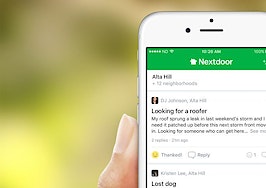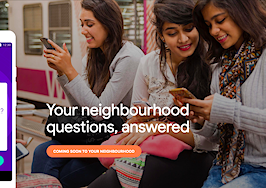Hyperlocal social network Nextdoor has ramped up its real estate offerings in recent years, including letting agents purchase prominent advertisements for themselves and their listings in specific ZIP codes, which show up for Nextdoor users online and in its mobile apps.
But for the first time since the feature was unveiled in the summer of 2017, Nextdoor has begun raising prices for these sponsored agent ZIP codes and is facing pushback from some Realtors who say the inflated cost isn’t justified by a service with mixed results.

Credit: Nextdoor
Realtors first began learning of the price increases for what Nextdoor calls its “neighborhood sponsor” feature in late 2018. Among them, Debbie Marett — a Coldwell Banker agent in the Austin, Texas, area — told Inman that she had been previously paying just over $60 a month for her ZIP code.
For that monthly fee, Marett was able to publish sponsored posts and place her name and contact information in a prominent location in Nextdoor’s real estate section.
Marett did ultimately close one sale thanks to someone “randomly” finding her name on the site, she said.
But last fall she learned that the price to keep sponsoring her ZIP code was going to jump to nearly $300 per month in 2019. So Marett canceled.
“It’s too costly for what they’re offering you,” she said. “I feel like my marketing dollars can be spent a lot better elsewhere.”

Debbie Marett
In an email to Inman, Nextdoor spokesperson Jenny Mayfield confirmed that the company was raising prices for its ZIP-code based neighborhood sponsor service. Mayfield said it was the first time rates for the service were being adjusted since they launched in late 2017, and that the adjustments “will be market- and demand-driven.”
“Rates are adjusted based on a formula that takes into account total members in the ZIP code, median home value and market score,” Mayfield also said. “We’ll regularly evaluate pricing to ensure it is consistent across the board.”
Nextdoor has grown into a go-to virtual destination for many communities. The site is designed to connect people who actually live in close proximity to each other, and signing up requires users to verify their address. Once onboard, users are mostly limited to content centered around their specific neighborhood, which has helped Nextdoor become a popular landing spot for posts about everything from parking concerns to lost pets.
Nextdoor was founded in 2008, but more recently has pushed further and further into real estate. Last summer, for example, the company launched a home valuation feature that put it into competition with Zillow. The company also struck up a partnership with Keller Williams and has prompted speculation that it could supplant Facebook.
The company’s pitch for sponsored ZIP codes prominently foregrounds the site’s market penetration and promises to help agents “maximize” their reach and grow their local reputation. The company sees the service as a way for Realtors to establish themselves as experts on the community.

Credit: Nextdoor
Mayfield also told Inman that “December was our largest growth for sponsored neighborhoods ever, so the offering continues to gain traction.”
Nextdoor did not provide information about the geography of the rate increases or specifics on how much prices might rise in any given market.
However, Marett isn’t the only Realtor for whom the new prices where too much to swallow. Scott Beville, a Coldwell Banker agent, told Inman that he had been paying for a ZIP code in the Denver area for much of the past year. He was paying just over $100, but didn’t receive any leads and finally decided to cancel when he learned the price would jump to $375 at the beginning of 2019.
“That’s the point where if I’m not getting results I’m not paying that much money for something” he explained.

Credit: Nextdoor
Beville’s take on the service is especially significant because, as of Monday afternoon, he was one of the “top agents” featured on Nextdoor’s own information page for the sponsored neighborhood service.
Another Realtor, at a boutique brokerage in the Oakland area, had almost the same experience as Beville. The Realtor, who asked that her name not be used, started paying for two ZIP codes in the spring of 2018. Initially, she said, she was paying $156 per month for two ZIP codes, and it seemed like a great investment.
“It looked to be a great way to actively communicate around my services,” she recalled.
But in December, she received an email from Nextdoor (which she has provided to Inman) stating that the combined price for the two ZIP codes would jump up to more than $500 per month. The email baffled the Realtor because she had yet to see any actual business from her investment in Nextdoor.
“There’s nothing to suggest that there’s any additional value that they’re offering for that kind of monthly ask,” she said. “You get much more value with a similar investment in something like Zillow.”
In total, the Bay Area Realtor said that she only had three total communications from her Nextdoor sponsorships, and none of them turned into clients or were even in the market to need her services.
“That was the extent of the results I got, and I certainly haven’t closed any deals as a result of it,” she added. “For me, under no circumstances was I going to continue.”
She also expressed confusion over the idea that demand was driving sponsorship prices up, saying that the market actually appeared to be cooling in late 2018, and “there’s nothing new about my neighborhoods in terms of their desirability.”
Asked about agent criticisms, Nextdoor VP of communications Steven Wymer told Inman that the objective of the service isn’t to directly generate leads, but rather to help agents build their reputations. Wymer described the service as a “long-term” feature and said it was a common misconception that it should or would function similarly to other online marketing opportunities from companies like Zillow.
“Nextdoor Real Estate’s offering is much more about brand building at a hyperlocal context,” he continued.
Asked how many agents use Nextdoor’s sponsored neighborhoods, Wymer said “thousands and thousands.”
The agents who spoke with Inman for this story did express some optimism about Nextdoor’s ability to help agents build a brand. Both the Oakland agent and Marett initially signed on, after all, because they first used Nextdoor as consumers and saw that it was a valuable online gathering place. And Beville said that he does think it’s “good for name recognition in my area.”
All three agents had misgivings about the service as well, but in the end it was the price jump that ultimately drove them away.

Imraan Ali
Imraan Ali, a Compass agent in Los Angeles, also described the sponsored ZIP code service as a potentially useful part of a “multilayered marketing plan.” Ali’s name pops up for Nextdoor users in parts of Los Angeles who click on the real estate tab, though he said he doesn’t pay for that position and doesn’t know why his name is being displayed. He speculated that it was because he serves as a community leader on the site and because so far there may not be enough agents who had actually paid for his ZIP code.
When asked if he would consider sponsoring a ZIP code in the future, Ali said it “just depends on the cost.”
Marett, on the other hand, has no plans to go back to the service. Though the one sale that came from her sponsorship covered the fees she paid in 2018, she also had concerns about not being able to post more often. And she was never totally sure who was seeing her information or how often it appeared.
Those concerns typified her waning belief in the service’s value, and in the end, she speculated that the price increases were about trying to get a bigger piece of the real estate pie.
“I just think because there’s so much going on with real estate,” she said, “they thought, let’s go for it.”













